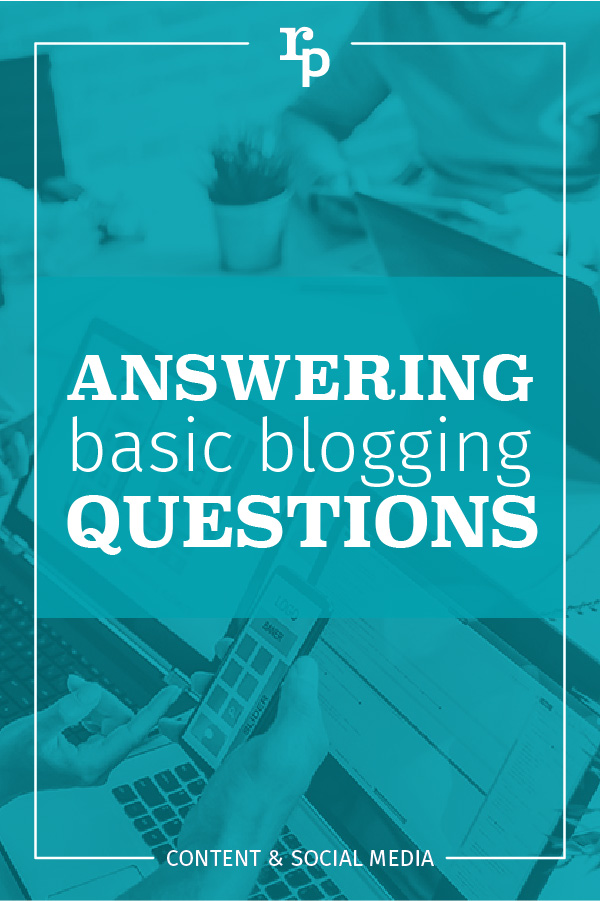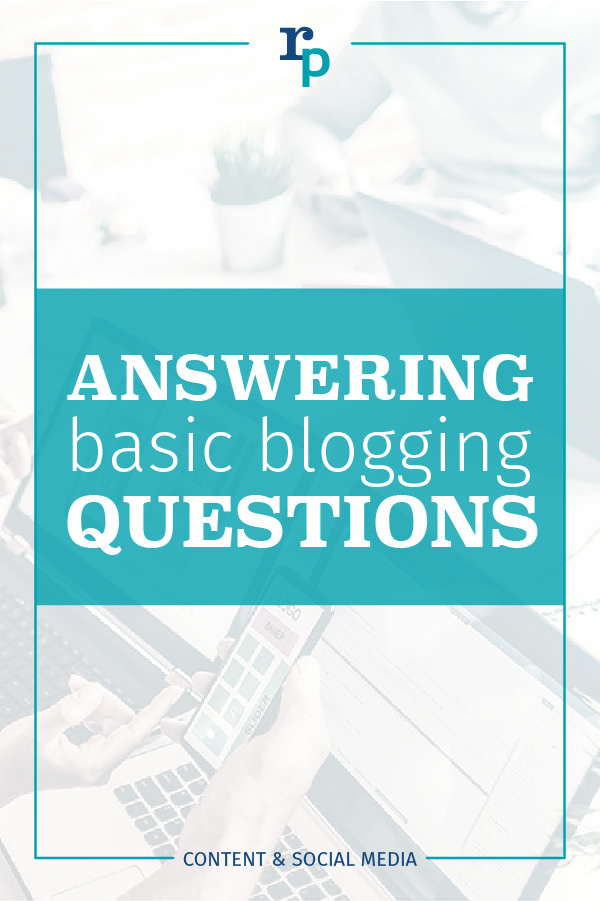Answering Basic Blogging Questions
This blog post was updated by Sam Von Tobel on 6/11/2020.
Blogging.
You’ve heard about it, you’ve seen it and you know it’s important for digital marketing strategy. But, that doesn’t stop folks from having questions about it.
As well they should! If you want to get the most you can out of blogging, you need to make a commitment to blog regularly, which means understanding all the why’s and ins and outs of blogging.
So, do you have questions? ‘Cause I’ve got answers! Let’s take a minute to look at some commonly questioned aspects of blogging and hopefully provide a little more insight as you take your first steps into the world of blogging… some blogging FAQs if you will.
Why the heck am I blogging?
When it comes to writing industry-related blogs, the real question is why the heck shouldn’t I be blogging? There is a long list of reasons why blogging is important, but let’s hit some highlights. Blogging…
helps you get discovered – Regularly generating content on your website and focusing on keywords within that content opens up the likelihood that your website will be found when people search for those and related keywords. As more and more people find their way to specific, high-performing blog posts, they can rise up the ranks in Google searches and give your entire website more visibility.
generates leads – If the content you are producing is good quality, readers will probably want more or be interested in contacting you to learn more about your services. You can help tempt them even more by inserting buttons and/or links to downloads or whitepapers you have produced, a contact form or your email sign-up and put them on your email list to receive new content or place them on an auto-responder campaign list. These contacts are high-quality leads and following up with additional content can help shorten the sales cycle of converting leads to customers.
establishes you as an authority – Not every Joe Schmoe is going to be an expert in your field. If they have a question they are going to do what everyone in this day and age does, Google it. As you begin to write and stockpile a library of blogs that inform, educate, and offer your opinion about subjects related to your industry, you will begin to establish yourself in the hearts and minds of readers as an authority on the subject. These people will likely continue to come back time and time again.
fuels the rest of your content marketing – Successful content marketing should also involve steady social media activity and regular email newsletters (but, of course, you already knew that). Your blogs, whether it is your very first one from several years ago to the newest one written this week, can be recycled into content to use in your social media feeds and used in email newsletters to help bring people to your website.
Do I need to be a writer to blog?
Some people are hesitant to start blogging because they don’t see themselves as a writer. However, nothing could be further from the truth: you don’t have to have any serious writing experience to produce a strong library of blog posts. The only expertise you need is something you already have: an extensive knowledge of your field of specialty.
A good number of your total population of readers is going to be folks who don’t have any or much knowledge about what they are reading. So, sometimes not being a total wordsmith is an advantage. Just lay out the information simply and in an easily understood manner, as if you were explaining it to a customer in your store or in their home. You don’t need a degree in creative writing to do that.
Should I blog about the same thing more than once?
If a topic has been written about before, you may be hesitant to write about it again. However, you shouldn’t be shy about treading the same ground multiple times. Having multiple blogs devoted to the same subject can help you take command of important keywords, which comes in handy for SEO purposes.
That subject could just be the jumping off point for a related topic that is an entire blog post of its own. Multiple blogs posts about a similar topic can be placed into a subcategory in the blog or be compiled to create downloads and white papers. Also, having multiple authors within your blog talking about the same subject can offer different perspectives that readers may find of interest and value. For that reason, I always encourage multiple blog contributors when possible.
How often should I be blogging?
This is a question that doesn’t have quite as clear-cut of an answer but is still an important consideration. How often a company blogs depends on a couple different factors. I got a little more in-depth about blogging frequency last year, but the short answer is: blog as much as possible.
Of course, running a business and doing your own marketing has its limitations. And maybe you don’t post to social media 15+ times a week and only do a newsletter once a month. If that’s you, blogging once a month may be satisfactory. If you need a steady stream of content to post to social media or your multiple newsletters, blogging upwards of 4 to 8 times a month could be more necessary. It all comes down to how much time and effort you can put into it… and sometimes it pays to have a little help.
How long should my blogs be?
This is the hundred million dollar question that everyone is asking about blogging, but not everyone has a concrete answer for. The reason for this quandary is primarily the responsibility of Google. The Google algorithm is constantly being updated and tweaked influencing what kind of content is given preference and better visibility, and very often the details of these changes are not disclosed publicly. They do this so no one is able to effectively game the system.
A noble idea for sure, but for those consistently blogging and trying to create content that will get traction and rank highly on Google, it is pretty frustrating. The consensus, however, seems to be that the kind of blogs that are making the most noise are dense with content, many suggesting that you should shoot for 2,000 words per blog post. That can be a pretty daunting task for non-writers to try and reach.
However, I look at blog posts more from the lens of quality over quantity. Of course, your blog posts can’t be only a few paragraphs long since there isn’t enough base content there for Google to really notice. We shoot for blog posts to be anywhere between 600 to 1,000 words and have seen good success with this size. What is more important than the length though is the quality, making sure no matter how long it is that you are using an appropriate amount of relevant keywords and that your blog posts read like they are written for the intended audience: people, not Google.
What other questions do you have about blogging? What internal debate has been holding you back from taking your first steps? I really want to know, so let’s talk.
want to learn more about blogging?
Check out our podcast on this topic!
Should I be blogging?
Yes! Blogging is a great way to add keyword rich content to your website to help you gain visibility on Google searches. Blogging is also a great way to establish yourself as an industry expert and provides regular content for your social media and email newsletter.
This content is brought to you by Roundpeg, an Indianapolis content marketing company.


